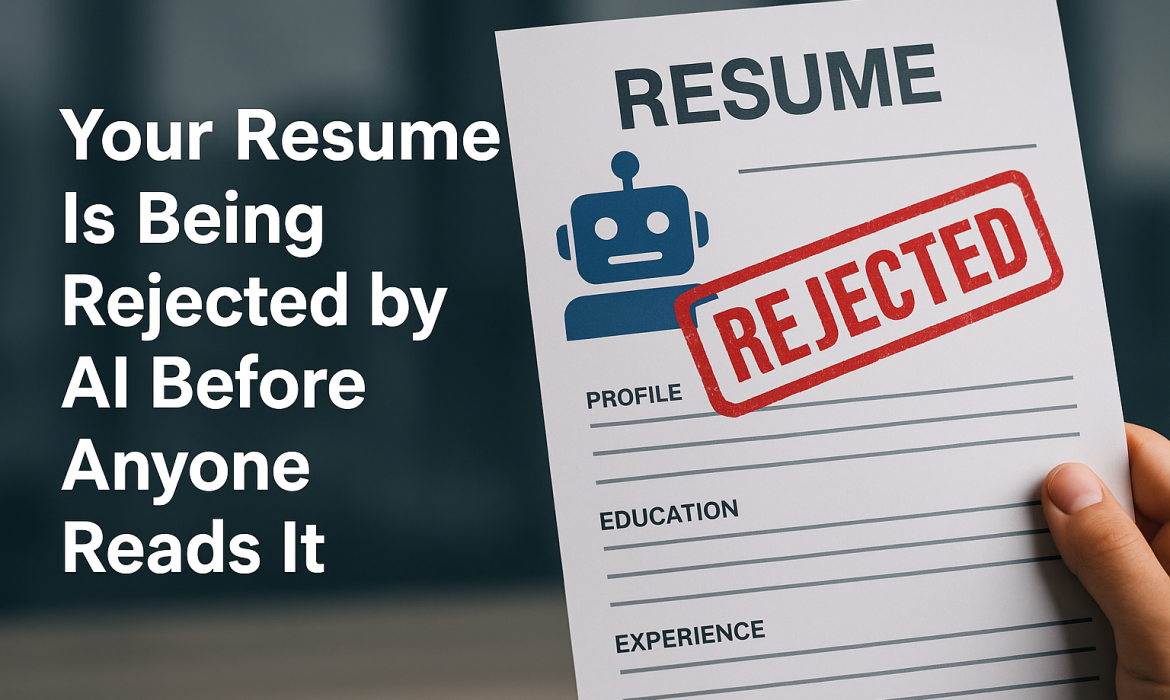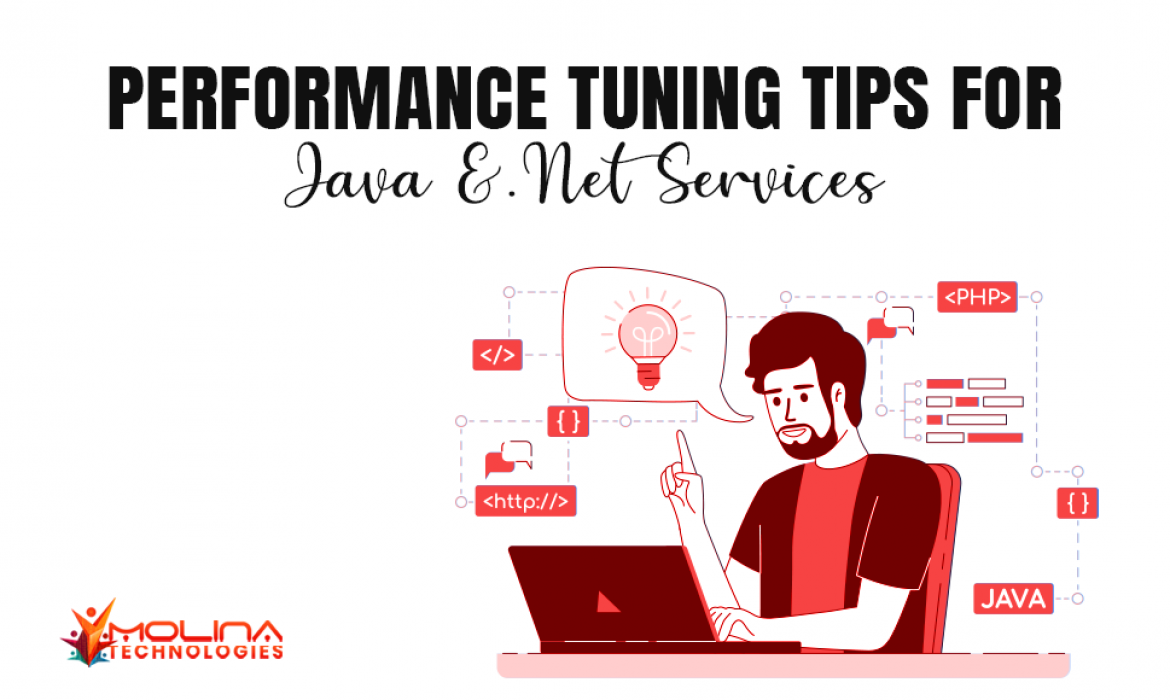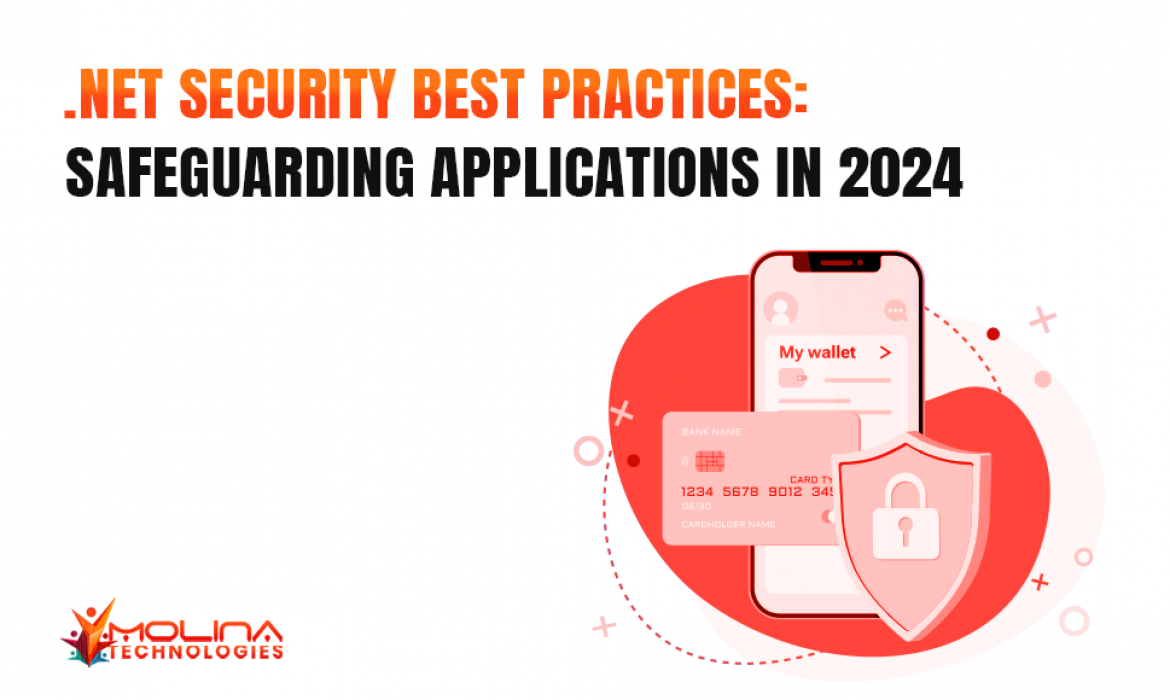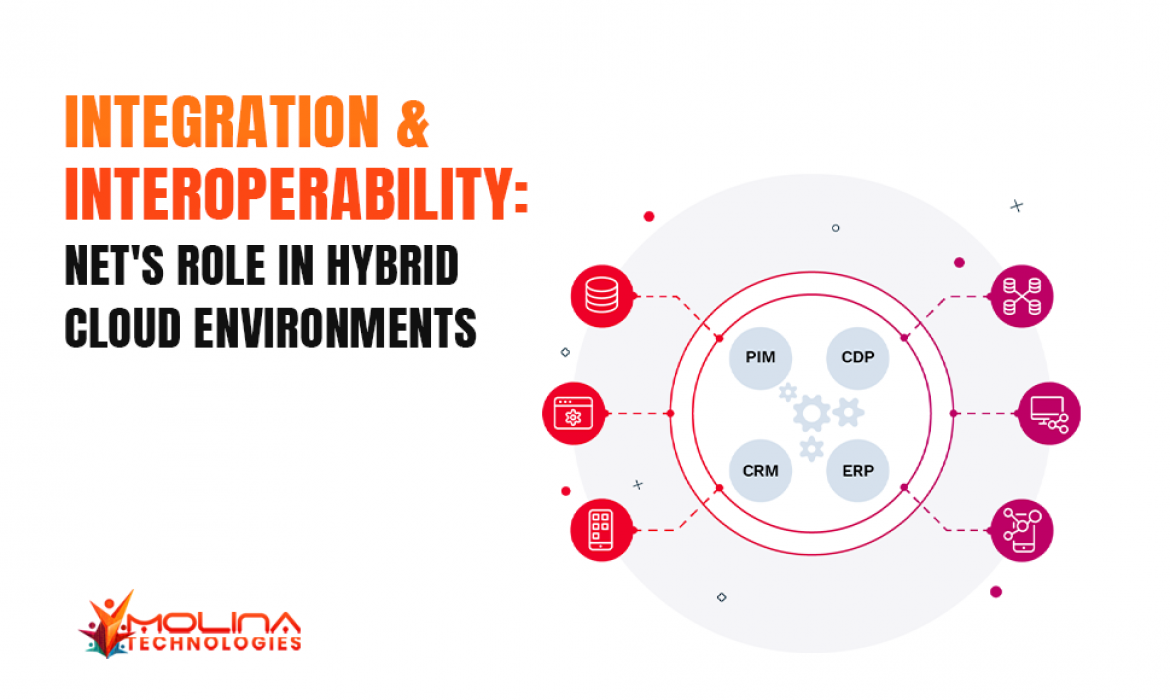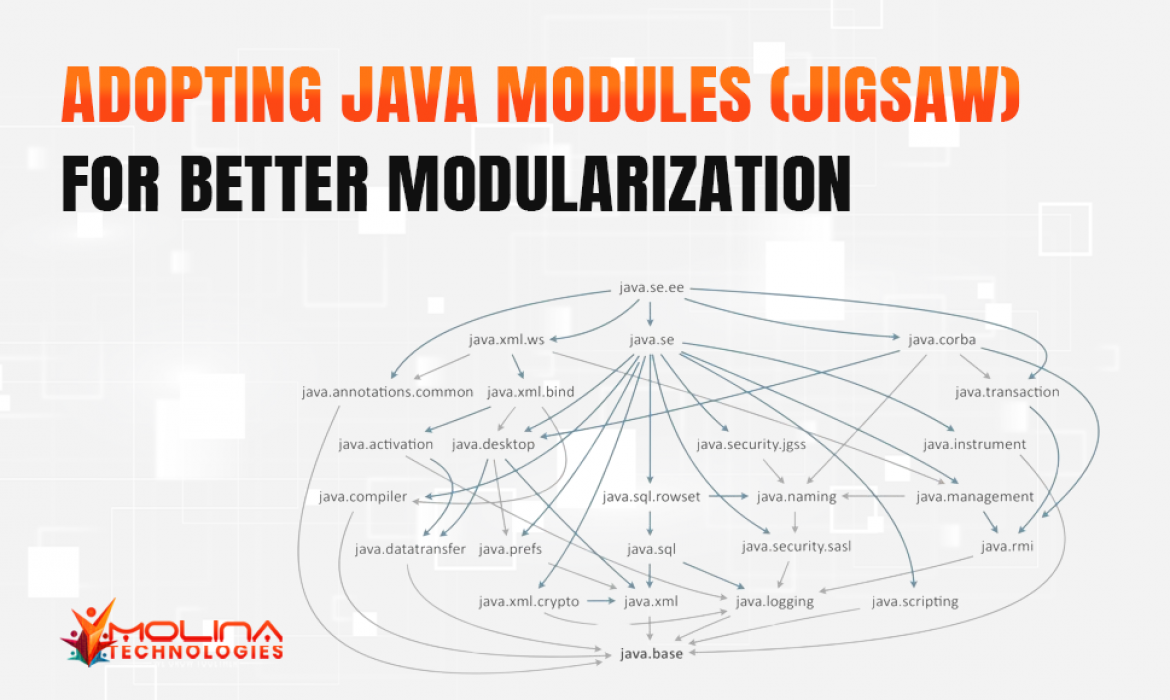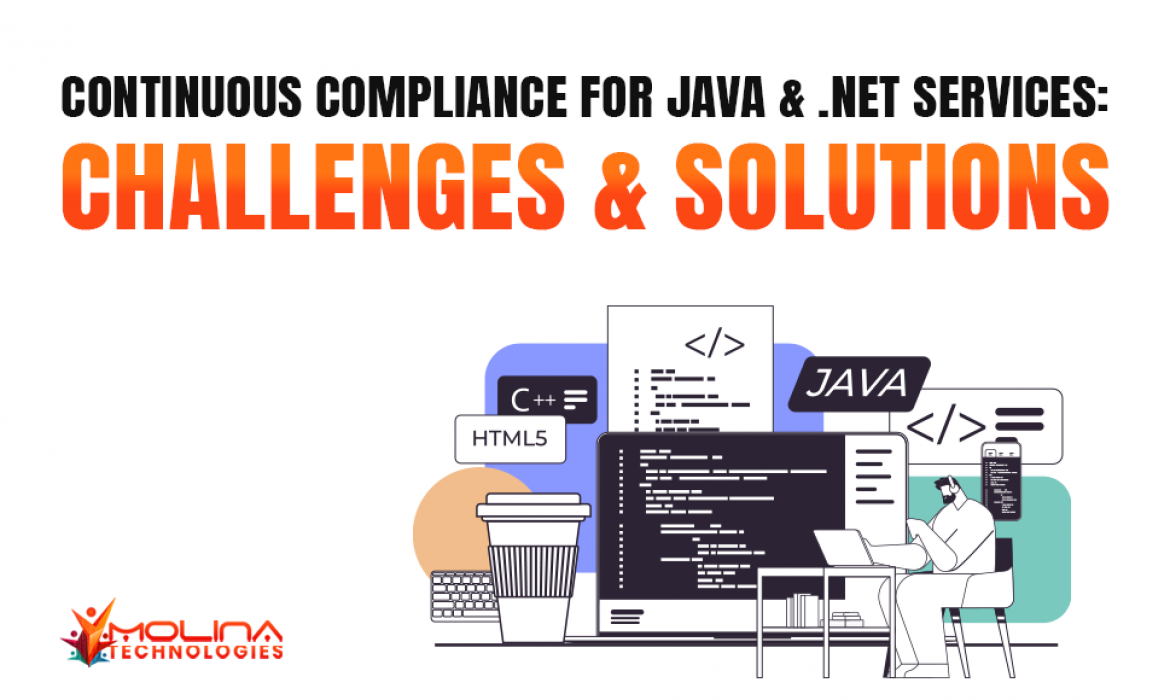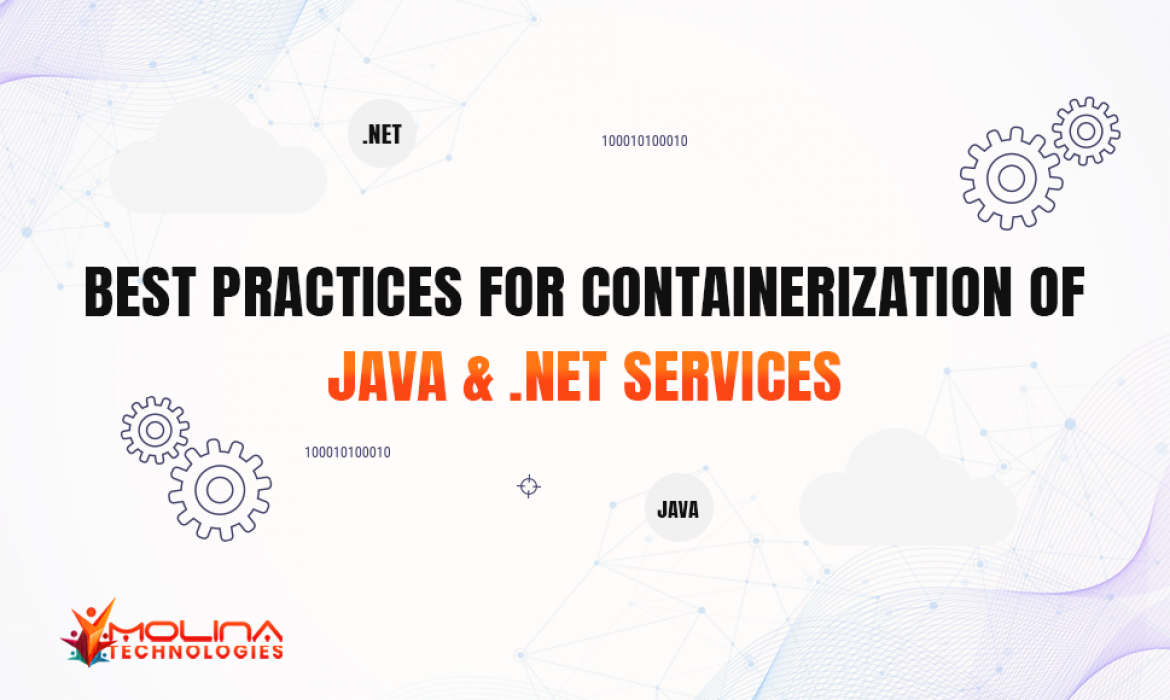Your Resume Is Being Rejected by AI Before Anyone Reads It
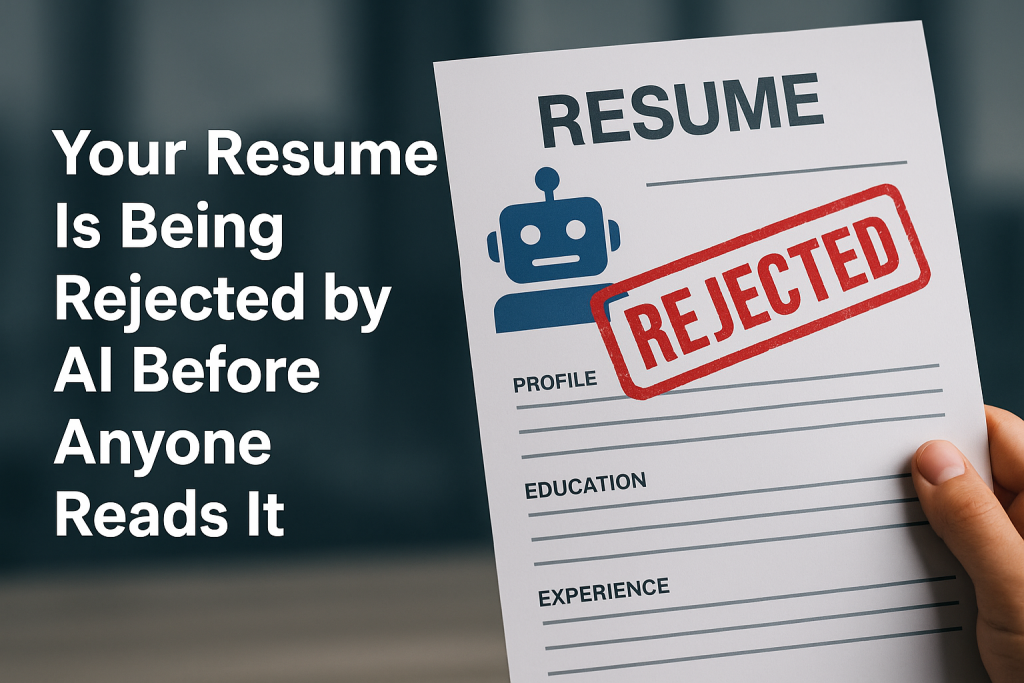
Applying for jobs can feel like shouting into the void. You send out dozens of applications, only to be met with silence. It’s not that you’re unqualified; it’s that your resume isn’t making it past the initial digital gatekeeper: the Applicant Tracking System (ATS). Mastering ATS resume optimization is crucial to ensure your application gets seen.
ATS software scans resumes for specific keywords and formats, filtering out those that don’t meet predefined criteria. Consequently, a well-qualified candidate might never get the opportunity for an interview simply because their resume wasn’t optimized for these systems. Understanding how to beat ATS resume scanners is critical for modern job search success.
Understanding Applicant Tracking Systems (ATS)
ATS are software applications used by employers to manage the recruitment process. They collect, sort, and rank resumes based on how well they match the job description. Key factors include the presence of relevant keywords, proper formatting, and clear articulation of skills and experiences. These systems are central to job application success with ATS.
Common Reasons for AI Resume Rejection
Understanding these pitfalls is the first step to overcoming IT skills gap challenges in America by ensuring your resume gets seen.
- Lack of Keywords: If your resume doesn’t include specific terms from the job description, the ATS may deem it irrelevant. This is a primary reason for AI resume rejection common reasons.
- Improper Formatting: Complex layouts, graphics, or unusual fonts can confuse the ATS, leading to misinterpretation or rejection.
- Generic Content: Using vague language or generic job descriptions fails to demonstrate your unique qualifications, preventing how to optimize resume for specific job description.
- Missing Sections: Omitting standard sections like a summary, skills, or education can negatively impact your resume’s score.
- Does ATS read graphics on resume? Generally, no. Avoid decorative elements like images, tables, or text boxes that can often scramble or be entirely ignored by ATS, leading to missed information.
How to Optimize Your Resume for ATS
These ATS resume optimization strategies and current trends are essential for all job seekers.
- Use Standard Formatting: Stick to simple, clean layouts with clear headings (e.g., “Work Experience,” “Education,” “Skills”) and basic bullet points. This ensures the ATS can parse your information correctly.
- Incorporate Keywords: Mirror the exact language used in the job description, especially for skills, qualifications, and specific tools. This includes understanding resume keywords for Applicant Tracking Systems.
- Customize for Each Application: Tailor your resume to highlight experiences and skills relevant to the specific role. This is crucial for Applicant tracking system bypass techniques that aren’t actually “bypassing” but rather working with the system.
- Avoid Complex Graphics and Tables: While many modern ATS can handle PDFs, heavily designed resumes with intricate tables, columns, or embedded images can still pose parsing challenges. Opt for simplicity to ensure readability for the machine.
- Include a Skills Section: Create a dedicated skills section for ATS friendly resume. List both hard skills (e.g., Python, AWS, Cybersecurity) and soft skills (e.g., Communication, Problem-Solving) that align with the job requirements. Consider separating them for clarity.
- File Format: Unless otherwise specified,
.docxor.pdfare generally the safest bets. If the job application explicitly requests a.pdf, use it. - Quantify Achievements: Instead of just listing responsibilities, quantify your achievements with numbers and data. For example, “Managed projects” becomes “Managed 5 agile projects, delivering 100% on time and increasing team productivity by 15%.”
Free Tools to Check Your Resume’s ATS Compatibility
Before you apply, use these free ATS resume checker online tools to assess and improve your resume’s compatibility. They offer valuable insights to boost your resume tips for AI screening.
- Resume Worded: Provides instant feedback on your resume’s strengths and weaknesses, offering actionable suggestions for improvement. Scan now
- Jobscan: Allows you to compare your resume against a specific job description, highlighting areas for optimization. Scan now
- Swooped: Offers a free resume grader that analyzes your resume’s content and formatting for ATS compatibility. Scan now
- ApplyPass: Provides a resume score and personalized recommendations to enhance your resume’s effectiveness. Scan now
- Career Genius: Delivers a detailed analysis of your resume, focusing on ATS compatibility and content impact. Check Now
The Role of AI in Modern Recruitment
AI has revolutionized the recruitment process, enabling employers to efficiently sift through large volumes of applications. While this technology streamlines hiring, it also places the onus on job seekers to ensure their resumes are ATS-friendly. Understanding and adapting to this shift is crucial for job search success. This helps US companies find qualified IT talent efficiently, so being on the candidate side means adapting.
Conclusion: Future-Proof Your Career with MolinaTek
Reducing IT time-to-hire in a competitive market starts with an ATS-optimized application. Navigating the complexities of AI-driven recruitment can be challenging, but you don’t have to do it alone. At MolinaTek, we specialize in preparing professionals for the modern job market. Our comprehensive programs focus on AI, cybersecurity, and DevOps, equipping you with in-demand skills and the knowledge to craft ATS-optimized resumes. We offer MolinaTek resume optimization help and guidance on job application success with ATS.
Join MolinaTek today and take the first step toward a successful and future-proof career, leveraging our expertise in MolinaTek’s solutions for IT workforce shortages and creating a diverse and inclusive IT workforce US.
Frequently Asked Questions (FAQs)
An Applicant Tracking System (ATS) is software used by employers to manage job applications. It scans, sorts, and ranks resumes based on keywords and formatting, helping recruiters efficiently filter large volumes of applications before a human reviews them.
To make your resume ATS-friendly, use standard formatting, incorporate keywords directly from the job description, customize it for each application, avoid complex graphics or tables, and include a clear skills section.
Most modern ATS can read both PDF and Word (.docx) files well. However, it’s generally safest to check the job application’s preferred format. If no preference is stated, a clean, simple PDF often maintains formatting best across systems, but a basic .docx file is also widely compatible.
The best way to find keywords is to thoroughly read the job description. Identify specific skills, tools, qualifications, and industry terms mentioned repeatedly. Integrate these exact keywords naturally throughout your resume.
Yes, modern ATS and integrated AI are becoming more sophisticated. Keyword stuffing (overloading your resume with irrelevant keywords) or using hidden text can be detected and may lead to your resume being flagged or rejected. Focus on natural language and relevant keywords.
Yes, free online tools like Resume Worded, Jobscan, Swooped, ApplyPass, and Career Genius can be very effective. They allow you to compare your resume against a job description and provide instant feedback on keyword matching, formatting issues, and overall ATS compatibility.
While ATS primarily focuses on resumes, it’s a good practice to ensure your cover letter also uses clear formatting and incorporates relevant keywords. Some ATS might scan cover letters, and even if not, a well-aligned cover letter is crucial for the human recruiter.
If your resume is rejected by AI despite your qualifications, it’s almost certainly due to ATS incompatibility. Revisit your resume’s formatting, keyword integration, and customization for the specific role. Utilize ATS checking tools to identify and fix issues, and consider professional guidance for advanced optimization.
Your July 2025 US Immigration News Update: Navigating the Latest Visa Bulletin & Policy Shifts

As we step into July, the US immigration landscape continues to evolve, bringing new shifts that directly impact IT professionals and companies navigating the Green Card process. The official release of the July 2025 Visa Bulletin provides critical updates on priority dates, and we’re also keeping a close eye on broader policy discussions that could shape your future.
Here’s Molinatek’s breakdown of what you need to know this month to keep your US tech career and immigration strategy on track. We’ll dive into the details, helping you understand the implications for your US Green Card journey and overall visa support needs.
The July 2025 Visa Bulletin: Key Movements for Employment-Based Categories
The U.S. Department of State has officially issued the July 2025 Visa Bulletin, and here’s what’s noteworthy for employment-based (EB) categories, particularly for our IT professionals in the United States:
EB-1 (Priority Workers):
- India: Remains at February 15, 2022. There’s no forward movement for Indian nationals this month.
- China: Shows a slight advancement to November 15, 2022.
- All Other Countries: Continue to be Current (C), meaning visas are immediately available for eligible applicants.
EB-2 (Professionals with Advanced Degrees or Exceptional Ability):
- India: Holds steady at January 1, 2013. No change this month, confirming the continued, substantial backlog for Indian nationals in this category.
- China: Advances modestly to December 15, 2020.
- All Other Countries: Remain at October 15, 2023. No movement for the “Rest of World” EB-2 category.
EB-3 (Skilled Workers, Professionals):
- India: Shows a small but welcome advancement of one week to April 22, 2013.
- China: Moves forward by three weeks to December 1, 2020.
- Philippines: Remains at February 8, 2023.
- All Other Countries: Experience a more significant jump of two months to April 1, 2023.
EB-4 (Certain Special Immigrants):
This category remains Unavailable (U) for all countries, having already reached its annual limit for Fiscal Year 2025. It’s anticipated to reset on October 1, 2025, with the start of the new fiscal year.
EB-5 (Immigrant Investors):
Most EB-5 categories (Rural, High Unemployment, Infrastructure set-asides) remain Current. The unreserved categories for China and India remain significantly backlogged.
Molinatek’s Insight for July:
The July bulletin brings some minor advancements, especially in certain EB-3 areas. However, the persistent long backlogs for India and China in EB-2 and EB-3 continue to underscore the real challenge. For US-based IT professionals from these countries, this situation reinforces the strategic importance of exploring alternative pathways like EB-1A or EB-2 NIW where applicable, or maintaining a well-planned, long-term perspective. USCIS has confirmed it will be honoring the Final Action Dates chart for employment-based categories for filing Adjustment of Status (I-485) applications in July, as detailed on the USCIS website for Visa Availability & Priority Dates.
Broader US Immigration Policy Discussions for July
Beyond the monthly priority dates, here are some broader policy discussions and trends that Molinatek is keeping a close watch on this July:
- Continued Focus on Border Measures and Enforcement: Expect ongoing debates and potential enforcement actions related to border security and how the US manages migration flows. While often focused on the southern border, these broader policy discussions can indirectly influence the overall immigration environment and even processing priorities for various visa types.
- Project 2025 and Future Policy Shifts: As we’ve touched upon, Project 2025 outlines a detailed agenda for a potential future administration, including significant proposed changes to US immigration policy. These include ideas like reductions in certain visa categories (like the H-1B), expanded deportation capabilities, and stricter enforcement measures. It’s crucial to remember that these are proposals and not current law. For July, these are likely to remain talking points in policy circles, rather than immediate executive actions. However, for IT professionals considering their permanent residency options in the US, these ongoing discussions highlight the need for adaptable and forward-thinking immigration strategies.
- Ongoing Visa Processing Streamlining Efforts: USCIS and the Department of State generally continue efforts to improve processing efficiencies wherever possible. While major breakthroughs are rare, smaller improvements in digital processing or interview scheduling can provide incremental benefits for applicants. For those asking how to check Green Card status or what affects the Green Card backlog, any improvements in processing can be welcome news.
Your Future in US Tech & Beyond Starts with Molinatek
The July 2025 Visa Bulletin, along with the broader policy landscape, serves as a fresh reminder that proactive and informed planning is absolutely essential for any IT professional building a long-term career in the US. The constant shifts, even minor ones, emphasize the value of having an expert partner by your side.
At Molinatek, our commitment goes beyond just matching you with top US tech jobs. We understand these complex immigration updates and work to translate them into actionable strategies for your career and US Green Card journey. We equip you with the knowledge to make informed decisions and connect you with the resources needed to navigate these pathways successfully. Our focus is to bring accurate information and expert guidance to our clients.
Ready to maximize your US tech career potential and secure your Green Card?
Contact Molinatek today for a personalized strategy session. Let us help you chart your course with confidence in the dynamic US tech and immigration landscape.
Disclaimer:
Please be advised that Molinatek is an IT staffing and consulting firm; we are not immigration attorneys or a law firm. The information provided in this blog post is for general informational purposes only and does not constitute legal advice. Immigration laws and policies are complex and subject to change. This content should not be considered a final ruling or a substitute for professional legal counsel.
Before making any decisions or taking any action regarding your immigration status or application, we strongly recommend that you conduct your own thorough research and consult with a qualified, licensed immigration attorney. Only an attorney can provide legal advice tailored to your specific circumstances. Molinatek is not responsible for any actions taken or not taken based on the information provided herein.
FAQs
For July 2025, the EB-2 India Final Action Date remains at January 1, 2013. This signifies a continued substantial backlog. For Indian IT professionals, it means the wait for an available Green Card number is still long, emphasizing the need for strategic planning and exploring alternative pathways like EB-1A or EB-2 NIW where eligible.
The July 2025 Visa Bulletin dictates when you can file your Adjustment of Status (I-485) application or when your immigrant visa can be issued. For H1B holders, particularly from India and China, the slow movement in EB-2 and EB-3 means careful monitoring of your priority date is essential to determine your eligibility to file or receive your Green Card. USCIS is honoring Final Action Dates this month.
Yes, the EB-2 National Interest Waiver (NIW) allows qualified IT professionals with advanced degrees or exceptional ability to self-petition for a Green Card, bypassing the need for employer sponsorship and PERM labor certification. This pathway is particularly attractive for those whose work significantly benefits the U.S. national interest. Molinatek can guide you on assessing your eligibility.
Processing times for I-140 (Immigrant Petition) and I-485 (Adjustment of Status) applications vary significantly based on the service center, visa category (EB-1, EB-2, EB-3), and country of chargeability. While specific times fluctuate, you can generally find the latest estimated processing times directly on the USCIS website.
For Indian IT professionals facing long backlogs in EB-2 and EB-3, exploring alternative categories like EB-1A (Extraordinary Ability) or EB-2 NIW (National Interest Waiver) can be crucial. Additionally, meticulously planning your H1B extensions, considering PERM portability, and staying informed on the July 2025 Visa Bulletin movements are vital steps. Molinatek specializes in strategic long-term planning for these scenarios.
Many large tech companies and even growing startups in the US continue to sponsor Green Cards for skilled foreign IT talent, especially in high-demand areas like cloud computing, AI, cybersecurity, and data science. Identifying these companies often involves researching their immigration policies, checking job descriptions for “sponsorship available,” or consulting with IT staffing firms like Molinatek that specialize in visa-sponsored placements.
How Class of 2025 Graduates Can Succeed in the 2025 Job Market

The Class of 2025 has graduated into a shifting job market—near-term outlook shows a 5.8% unemployment rate for recent grads, compared to 4.2% nationally (U.S. Bureau of Labor Statistics) . Add in AI-powered hiring and economic uncertainty, and you’ll quickly realize: entry-level roles now demand more than ever. Here’s how to break through and succeed.
Why Entry-Level No Longer Means “Easy”
The old “foot-in-the-door” entry-level job? It’s being redefined—fast.
- AI disruption: A Clarify Capital survey revealed that 86% of executives plan to replace entry-level roles with automation. Some already have.
- New expectations: Companies now want hires who can think critically, solve problems, and adapt quickly—not just follow instructions.
Tip: Treat your first job like it’s your second—come prepared to perform, not just learn.
Where the Jobs Still Are in 2025
The job market isn’t dead—it’s evolving. And it’s creating space in sectors that reward skills, adaptability, and fresh perspectives.
- Cybersecurity – With data breaches on the rise, this field needs smart thinkers.
- Healthcare & life sciences – From data techs to compliance officers, jobs are growing.
- Green energy & sustainability – A huge driver for government and private hiring.
- Professional services – HR, policy, compliance, and operations are hiring across the board.
- Skilled trades – Often overlooked, these jobs are stable, essential, and well-paying.
And don’t discount logistics, hospitality, or support roles—they’re entry points that can fast-track you into leadership if you play it smart.
How AI Is Reshaping the Hiring Process
Artificial Intelligence isn’t just changing job roles—it’s also changing how you get the job.
- ATS screening: Many resumes are rejected automatically if they’re not keyword-optimized.
- AI-powered interviews: Companies now use AI to assess tone, pacing, and responses.
- Portfolio > Paper: Skills-based hiring means your GitHub, Notion docs, or real projects matter more than GPA.
Key takeaway: Hiring is now about what you can do, not just what you studied.
Five Smart Moves for 2025 Grads
- Tailor your resume for every job
– Use keywords from the job post and align your language with the company’s tone. - Demonstrate outcomes, not just duties
– Replace “managed a project” with “increased user engagement by 42% in 3 months.” - Use AI to your advantage
– Tools like Jobscan, TealHQ, and Resumeworded help you optimize your resume. - Master the STAR method for interviews
– Use Situation, Task, Action, Result to show how you think under pressure. - Pick growth over glamor
– A job that offers learning, mentorship, and leadership is more valuable than one with just a big title.
Common Mistakes to Avoid
- Sending the same resume to 50 jobs
- Underestimating the power of networking
- Over-relying on job boards (use LinkedIn, alumni groups, niche platforms)
- Ignoring soft skills like communication and time management
- Saying “I’m just a recent grad”—own your value!
Partner with MolinaTek: Your Trusted IT Staffing Consultancy in US
At MolinaTek, we empower Class of 2025 grads to transform ambition into success:
- Expert-led training: AI, cybersecurity, and cloud DevOps
- Resume optimization and interview prep
- Access to top employers through our IT staffing network
- Personalized placement support
Whether it’s your first job or the next career move, MolinaTek is your guide—aligned with evolving industry demands.
Contact MolinaTek today to learn how grads can land their first role, built to last.
FAQs
AI adoption is rising rapidly, and entry-level jobs are being replaced or redefined. Employers now demand more skills and adaptability from new graduates than ever before.
Use resume optimization tools like Jobscan and ResumeWorded. Learn prompt engineering and reference AI tools in your applications to show fluency.
Using the same resume for every job and underestimating the power of networking. You must tailor each application and build connections.
MolinaTek is the best IT staffing consultancy in the USA. It offers future-ready training, personalized job placement support, and access to employers actively hiring in AI, cloud, and cybersecurity sectors.
U.S. Halts Student Visa Interviews: What Social Media Vetting Means for International Applicants

The U.S. government has significantly increased scrutiny over international student visa applicants, and your online presence might be the reason for a denial.
Under heightened enforcement policies, particularly seen during the Trump administration and reportedly continued in parts, U.S. visa officers are closely examining applicants’ digital behavior. Social media activity, search patterns, and even browser history may now play a role in whether you get approved or face denial, delay, or revocation of your visa.
Why the U.S. is Scrutinizing Student Social Media
In the name of national security, past and present U.S. administrations have directed visa officers to vet applicants not only based on academic and financial credentials—but also digital footprints.
This includes:
- Posts or comments critical of U.S. policy
- Content expressing support for banned organizations or controversial causes
- Online discussions about working illegally or seeking part-time jobs while on an F-1 visa
- Shared content that may be seen as hostile to U.S. values or interests
Even if you believe your content is harmless or taken out of context, immigration authorities have wide discretion to make determinations based on perceived intent.
What This Means for International Students
Many students are unaware that their public social profiles could be reviewed during visa interviews or revalidations. Here are the risks:
- Delays in visa issuance due to additional background checks
- Revocation of approved visas if concerning digital activity is discovered later
- Travel bans or refusals based on past posts—even deleted ones
The U.S. Department of Homeland Security mandates that visa applicants list their social media handles from the past five years. If anything flagged is considered threatening, it can be grounds for denial.
How to Protect Your Visa Status
To ensure your student visa process goes smoothly:
- Review all public social media posts before applying or renewing a visa
- Avoid political commentary, hate speech, or jokes that may be misinterpreted
- Never discuss illegal part-time jobs or working without authorization
- Be honest on DS-160 and other immigration forms about your social media usage
- Consult legal experts or advisors if you’re unsure about your online footprint
What You Can and Can’t Do as a Student on an F-1 Visa
While you are encouraged to engage in academic and cultural exchange, U.S. immigration laws prohibit:
- Unauthorized off-campus work
- Participation in political rallies that involve violence or illegal actions
- Any involvement with foreign groups on U.S. sanctions lists
Failure to comply can lead to your visa being revoked—even after you’ve entered the country.
MolinaTek Helps Students Prepare for Visa Success
At MolinaTek, we understand how critical your U.S. education goals are. That’s why we not only offer career-focused IT training programs—but also expert visa advisory support. From compliant documentation to cultural guidance and interview preparation, our team is here to help you enter and succeed in the U.S. the right way.
FAQs
Yes. U.S. immigration officers now review applicants’ social media handles submitted with the DS-160 form. Content deemed inappropriate, politically sensitive, or suggesting intent to violate visa terms can negatively impact approval.
Posts criticizing U.S. policies, discussing illegal part-time jobs, or expressing support for banned groups may be flagged during scrutiny. Even if deleted, previously visible content could still be reviewed.
Yes. You’re required to list all social media platforms used in the past five years. Failure to disclose may be viewed as a misrepresentation, impacting your visa status.
Visa May Be Revoked If Students Drop out, Skip Classes Without Informing: US Embassy In India

In a recent advisory, the U.S. Embassy in India emphasized the critical importance of adhering to student visa regulations. Students who drop out, skip classes, or leave their academic programs without notifying their institutions risk immediate visa revocation and potential ineligibility for future U.S. visas.
Understanding the Advisory
The embassy’s warning underscores the necessity for international students to:
- Maintain full-time enrollment: Students must be enrolled full-time unless granted a reduced course load by their Designated School Official (DSO).
- Attend classes regularly: Consistent class attendance is mandatory; unexcused absences can be deemed violations.
- Communicate changes promptly: Any changes in academic status, such as dropping out or taking a leave of absence, must be promptly communicated to the institution.
Failure to adhere to these guidelines can result in visa revocation and jeopardize future visa applications.
Consequences of Non-Compliance
Non-compliance with visa regulations can lead to severe repercussions:
- Immediate visa revocation: Students may be required to leave the U.S. immediately.
- Loss of legal status: Remaining in the U.S. without valid visa status can lead to unlawful presence, affecting future immigration benefits.
- Ineligibility for future visas: A history of non-compliance can hinder the chances of obtaining U.S. visas in the future.
Maintaining Compliance
To ensure compliance with visa regulations:
- Stay enrolled full-time: Understand and adhere to your institution’s requirements for full-time enrollment.
- Communicate with your DSO: Before making any changes to your academic status, consult with your DSO to understand the implications and necessary procedures.
- Avoid unauthorized employment: Engaging in work without proper authorization can lead to status violations.
Conclusion
Maintaining your student visa status requires diligence and adherence to U.S. immigration regulations. By staying informed and proactive, you can ensure a successful academic journey in the United States.
At MolinaTek, we help international graduates build successful careers in the U.S. while guiding them through visa and green card pathways. Our training programs are tailored for high-demand tech roles, and we work closely with employers who sponsor work visas and permanent residency.
- Expert-led IT training in AI, cloud, DevOps, and cybersecurity
- End-to-end support from OPT to H-1B to green card sponsorship
- Career services including resume coaching, job matching, and interview prep
Contact MolinaTek today to start your U.S. tech career and take confident steps toward permanent residency.
FAQs
You may apply for reinstatement through U.S. Citizenship and Immigration Services (USCIS). Consult with your DSO for guidance on this process.
While some online coursework may be permitted, there are limits. Consult with your DSO to ensure compliance with visa regulations.
Communicate with your DSO and academic advisors to explore options such as a reduced course load or academic support services.
Performance Tuning Tips for Your Java and .NET Services
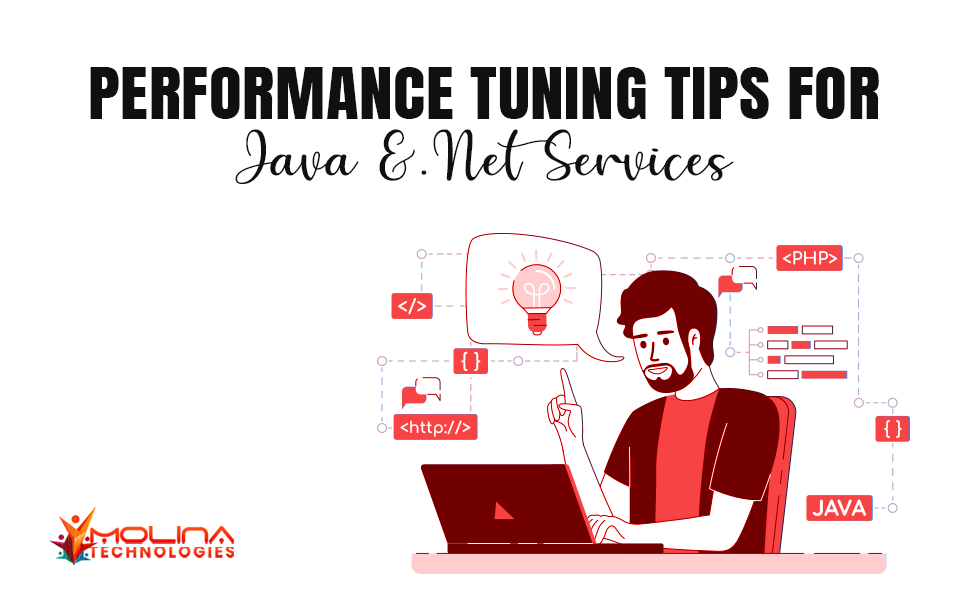
Java and .NET performance tuning improves application speed, enhances scalability, and optimizes memory efficiency. Slow applications increase response times, infrastructure costs, and performance bottlenecks, affecting user experience and system stability.
At MolinaTek, we understand that fine-tuning performance is critical for high-traffic enterprise applications, cloud-based platforms, and real-time data processing systems. Optimizing your Java and .NET services can dramatically reduce response times, improve resource utilization, and enhance overall system stability.
This guide explores proven strategies for optimizing Java and .NET applications, covering memory management, caching, asynchronous execution, and real-time monitoring to ensure peak efficiency.

Java Performance Tuning Strategies
- Analyze and Profile for Bottlenecks: Performance tuning starts with identifying inefficiencies. Instead of making assumptions, use profiling tools to analyze CPU usage, memory allocation, and slow-running code:
JProfiler, YourKit, and VisualVM provide deep insights into heap memory, garbage collection behavior, and thread execution.
Profiling helps detect slow-running queries, excessive object creation, and inefficient loops, ensuring the application remains optimized for high-speed processing. - Optimize Garbage Collection for Efficient Memory Management: Java’s Garbage Collector (GC) automatically manages memory, but default settings might not always be optimal. Inefficient garbage collection can introduce latency spikes and affect system responsiveness, particularly for high-throughput applications.
To improve memory efficiency, consider using G1 GC for applications requiring low pause times and ZGC for real-time applications that demand ultra-low latency. Adjusting heap size configurations (Xms, Xmx) ensures that memory allocation remains stable and prevents excessive garbage collection overhead.
By tuning garbage collection strategies, Java applications can handle large workloads more efficiently, reducing memory fragmentation and ensuring faster response times.
- Utilize the Right Data Structures for Faster Execution: The choice of data structures significantly affects memory usage, processing speed, and system efficiency. Using the wrong data structure can lead to unnecessary overhead and increased CPU cycles.
For optimized performance, use HashMap instead of ArrayList for fast lookups, implement ConcurrentHashMap in multi-threaded environments, and leverage LinkedBlockingQueue for high-performance producer-consumer workflows. Selecting the right collections and data structures ensures that applications process large data volumes efficiently while maintaining speed and responsiveness.
- Implement Caching to Reduce Processing Overhead: Fetching data repeatedly from a database increases response times and places a heavy load on backend services. Implementing caching mechanisms improves performance by storing frequently accessed data for faster retrieval.
Solutions like Caffeine, Ehcache, Redis, and Memcached provide in-memory caching that reduces redundant computations and minimizes database queries. Implementing JPA Second-Level Caching further enhances database query performance by reducing repetitive requests to the underlying storage layer.
Caching not only improves execution speed but also reduces server load, ensuring that applications run smoothly under high traffic conditions.

.NET Performance Tuning Techniques:
- Leverage Just-In-Time (JIT) Compilation for Faster Execution:.NET applications use JIT compilation to convert Intermediate Language (IL) into machine code at runtime. Without proper optimizations, JIT compilation increases execution delays and consumes excessive CPU resources.To improve performance, enable Tiered Compilation, which prioritizes frequently executed code paths, and use ReadyToRun (R2R) Binaries to precompile assemblies, reducing startup time. Optimizing hot path execution ensures that method calls and object allocations remain efficient, eliminating unnecessary CPU cycles.By tuning JIT compilation settings, .NET applications achieve faster response times and reduced processing overhead.
- Optimize Asynchronous Execution for High Throughput: Blocking operations slow down request handling, making applications less responsive under heavy loads. Implementing asynchronous execution ensures that multiple tasks can run in parallel, improving efficiency.
Using async/await for I/O-bound tasks, leveraging Task Parallel Library (TPL) for multi-threaded workloads, and optimizing database queries with asynchronous execution significantly improves throughput and application scalability. Asynchronous programming allows .NET applications to handle large numbers of concurrent users without compromising performance.
- Precompile ASP.NET Views for Faster Rendering: When ASP.NET dynamically compiles views at runtime, it adds extra processing overhead, leading to slower response times. Precompiling views eliminates this runtime overhead, ensuring faster rendering and improved user experience.
By enabling Precompiled Razor Views, storing frequently accessed content in Response Caching, and optimizing database queries with indexing and pagination, .NET applications can improve page load speed and overall responsiveness.
Precompiling views ensures minimal processing delays, making ASP.NET applications more efficient and scalable.
Continuous Performance Monitoring & Optimization
Performance tuning is not a one-time process—it requires continuous monitoring and iterative improvements. Use monitoring tools to track real-time performance:
- Application Insights, New Relic, JMeter, and k6 provide detailed analytics on CPU utilization, memory allocation, and database query performance.
- Automated alerts detect and resolve performance degradation before it affects users.
- Implement structured monitoring strategies to maintain peak efficiency and reduce infrastructure costs.
With real-time tracking, applications remain resilient under high traffic conditions, ensuring minimal downtime and optimal user experience.
Conclusion
Java and .NET applications need continuous performance tuning to stay fast, scalable, and cost-efficient. By implementing profiling techniques, optimizing memory management, leveraging caching, and improving async execution, businesses can reduce latency, improve throughput, and enhance user experience.
Performance tuning ensures that applications run efficiently, with minimal resource consumption and faster execution times. Proper optimization helps improve scalability, reduce server load, and enhance user experience, making applications more responsive and cost-effective.
Java developers can use JProfiler, YourKit, and VisualVM to analyze memory allocation, CPU usage, garbage collection behavior, and thread execution. These tools help identify bottlenecks and optimize code execution.
Caching reduces redundant database queries by storing frequently accessed data in memory. Solutions like Caffeine, Redis, and Memcached ensure faster data retrieval, improved response times, and lower backend load.
Optimizing garbage collection involves choosing the right GC strategy, such as G1 GC for high-throughput applications or ZGC for ultra-low latency requirements. Adjusting heap sizes (Xms, Xmx) ensures efficient memory allocation and minimal GC interruptions.
.NET applications can benefit from JIT compilation optimizations, async/await implementation, and precompiling ASP.NET views. These techniques enhance execution speed, optimize memory usage, and improve request handling.
Secure .NET Applications in 2025: Latest Threats & Best Practices

Cyber threats in 2025 are smarter, AI-powered, and more automated than ever. Attackers now use AI-powered exploits, deepfake phishing, and quantum computing threats to breach applications. To secure .NET applications, developers must implement advanced security measures that evolve with these cyber risks.
Here at MolinaTek, we understand the importance of building secure .NET applications. This blog equips you, the intrepid developer, with the latest best practices to fortify your code and safeguard user data.

Top Cybersecurity Risks for .NET Applications
AI-Powered Cyberattacks
Attackers now use AI-driven malware to bypass traditional security measures. These self-learning algorithms can adapt to system defenses, making detection more difficult.
Quantum Computing Security Risks
With advancements in quantum computing, traditional encryption methods like RSA and ECC are at risk. Attackers can use quantum algorithms to crack these encryptions, exposing sensitive data.
API Security Breaches
In 2025, over 80% of cyberattacks will target vulnerable APIs. Poor security measures expose authentication tokens, user data, and core business logic.
Supply Chain Attacks on .NET Libraries
Cybercriminals insert malicious code into open-source .NET libraries, which developers unknowingly integrate into their applications. This risk highlights the importance of supply chain security.
Cloud-Native Security Threats
With more .NET applications moving to serverless and containerized architectures, misconfigured cloud security settings pose a serious risk. Attackers can access sensitive data if security policies are not enforced.
Understanding these threats is the first step in building a proactive security strategy for 2025.
Best Security Practices for .NET Developers in 2025
To secure .NET applications, developers must implement multi-layered security strategies covering authentication, encryption, API security, and cloud protection.
AI-Powered Threat Detection & Response
Traditional security measures are no longer sufficient. AI-driven security tools now analyze patterns, detect anomalies, and automate real-time threat responses.
Best Practices:
- Use Microsoft Defender for Cloud for AI-powered threat detection.
- Enable behavioral analytics to spot suspicious activity.
- Implement automated security monitoring with AI-driven SIEM tools.
Post-Quantum Cryptography (PQC) for Data Security
Quantum computing is making traditional encryption methods less secure. Developers should migrate to quantum-resistant cryptographic algorithms to protect sensitive data.
Best Practices:
- Use Quantum-Safe Encryption methods like CRYSTALS-Kyber & CRYSTALS-Dilithium.
- Replace RSA & ECC encryption with NIST-approved post-quantum cryptography.
- Implement TLS 1.3+ with hybrid cryptographic techniques to defend against quantum attacks.
API Security: Zero Trust & Continuous Authentication
APIs remain the top attack vector in 2025. Developers must enforce Zero Trust security models and continuous authentication to prevent API breaches.
Best Practices:
- Use OAuth 2.1 & OpenID Connect for secure authentication.
- Deploy API Gateway Security Policies to filter malicious requests.
- Implement Continuous Authentication to detect session hijacking attempts.
Securing the .NET Supply Chain: Software Bill of Materials (SBOM)
With increasing supply chain attacks, maintaining visibility into third-party dependencies is essential.
Best Practices:
- Generate a Software Bill of Materials (SBOM) to track all third-party components.
- Regularly scan dependencies with OWASP Dependency-Check & Snyk.
- Verify the integrity of open-source packages before integrating them.
Cloud-Native Security for .NET Applications
As .NET applications shift to Kubernetes, Docker, and Azure Serverless, cloud security must be automated and proactive.
Best Practices:
- Use Azure Key Vault for managing API keys & secrets.
- Implement Infrastructure-as-Code (IaC) security policies to prevent misconfigurations.
- Enable cloud-native intrusion detection to monitor runtime security in containers.

Final Thoughts: The Future of .NET Security
Cyber threats are evolving rapidly, requiring advanced security strategies to protect .NET applications. By implementing:
- AI-driven security analytics
- Post-quantum encryption techniques
- Zero Trust API security
- Cloud-native security frameworks
.NET developers can stay ahead of evolving cyber risks.
MolinaTek: Your Guide on the .NET Security Frontier
Building secure .NET applications is not a one-time task but a continuous journey. At MolinaTek, we empower developers and organizations with the latest security best practices to defend against evolving cyber threats.
Our expert-led training programs and security consulting services ensure that businesses stay ahead of security risks while maintaining compliance and industry best practices.
Here’s How MolinaTek Can Help:
- Security Training & Workshops – Equip your team with the latest cybersecurity strategies through hands-on training and expert-led workshops.
- Security Code Reviews – Our security experts conduct in-depth code analysis to detect and remediate vulnerabilities before they become critical risks.
- Security Architecture Consulting – We help businesses design and implement secure .NET application architectures, ensuring compliance with modern security frameworks.
- Continuous Threat Monitoring – Our security team monitors emerging threats and provides real-time updates, ensuring your applications remain protected from the latest attacks.
By partnering with MolinaTek, you can build robust, scalable, and highly secure .NET applications that inspire trust and confidence among users.
Security is an ongoing process, not a final destination. Let MolinaTek help you navigate the security challenges of 2025 and beyond.
Frequently Asked Questions (FAQs)
The top threats include AI-powered cyberattacks, quantum computing vulnerabilities, API security breaches, supply chain attacks, and misconfigured cloud security settings.
Use OAuth 2.1, OpenID Connect, and API Gateway security policies. Implement Zero Trust security models with continuous authentication.
Migrate to post-quantum cryptographic algorithms like CRYSTALS-Kyber and enable TLS 1.3+ hybrid encryption for future-proof security.
Maintain a Software Bill of Materials (SBOM), regularly scan dependencies using OWASP Dependency-Check, and verify third-party package integrity.
Use Microsoft Defender, Azure Security Center, OWASP ZAP, and Snyk for real-time security monitoring and vulnerability detection.
NET’s Role in Integrating Hybrid Cloud Ecosystems

The modern IT ecosystem relies on .NET hybrid cloud integration to connect on-premises infrastructure, public cloud platforms, and edge computing nodes. Businesses need this seamless connectivity to enhance security, scalability, and cost-efficiency while managing complex cloud architectures.This hybrid approach enables organizations to:
- Maintain security & compliance for sensitive data
- Leverage the scalability & innovation of public cloud platforms (Azure, AWS, GCP)
- Process data closer to the source with edge computing for low-latency applications
However, seamless integration across these environments remains a challenge. Legacy systems, fragmented platforms, and incompatible architectures often slow down digital transformation efforts. This is where .NET emerges as the ultimate integration framework for hybrid cloud ecosystems.

Why .NET is the Backbone of Hybrid Cloud Integration
.NET has evolved into a cross-platform, cloud-native framework, making it the go-to technology for hybrid cloud connectivity. Here’s how .NET enables businesses to build, scale, and integrate applications seamlessly across diverse cloud environments:
Cross-Platform Compatibility
.NET applications run on Windows, Linux, macOS, Docker containers, and Kubernetes. Developers can write code once and deploy it anywhere, eliminating compatibility issues between on-premises and cloud-based environments.
Rich Ecosystem of Libraries & Frameworks
With thousands of pre-built libraries and frameworks, .NET accelerates the development of cloud-integrated applications. Businesses can leverage tools like ASP.NET Core, Entity Framework, and Azure SDKs to build scalable, cloud-connected services.
Secure & Compliant Development
Security is a top priority in hybrid cloud environments. .NET provides built-in authentication, encryption, and compliance tools, ensuring secure data transmission across multi-cloud infrastructures. Features like Microsoft Entra ID (formerly Azure AD), OAuth 2.1, and Zero Trust security reinforce enterprise-grade protection.
Language Flexibility & Interoperability
.NET supports C#, F#, VB.NET, and even JavaScript (.NET Core), enabling businesses to:
- Leverage existing developer expertise
- Ensure smooth integration with third-party services
- Reduce development complexity in heterogeneous environments
Real-World Applications: How .NET Bridges the Hybrid Cloud Gap
Modernizing Legacy Applications for the Cloud
Many enterprises still rely on legacy on-premises applications that were not built for the cloud. .NET Core and ASP.NET Core provide tools to modernize these applications, enabling:
- Seamless cloud migration without rewriting code from scratch
- Microservices-based transformation for scalability and agility
- Cloud-native deployment using Docker, Kubernetes, and Azure Container Apps
Building Microservices for Multi-Cloud Deployments
Microservices architectures are essential for hybrid cloud applications. .NET’s lightweight architecture allows developers to:
- Deploy microservices across different cloud providers
- Ensure resilience, scalability, and high availability
- Use Dapr (Distributed Application Runtime) for cross-cloud service communication
Creating Hybrid Data Pipelines
Data is the fuel of digital transformation, but managing it across on-premises and cloud environments is complex. .NET enables businesses to:
- Integrate on-premises databases (SQL Server, Oracle) with cloud data lakes
- Use Azure Data Factory & .NET SDKs for seamless data orchestration
- Implement real-time data streaming with Azure Event Hubs & Apache Kafka

.NET’s Expanding Role in Hybrid Cloud Security
Security remains a major concern for hybrid cloud architectures. .NET provides enterprise-grade security features to protect data across all cloud platforms.
Zero Trust Security for Hybrid Cloud
- Enforce multi-layered authentication with OAuth 2.1 & OpenID Connect
- Implement Role-Based Access Control (RBAC) & Attribute-Based Access Control (ABAC)
- Secure on-prem & cloud-based applications with Microsoft Entra ID (Azure AD)
Securing API & Service Communication
- Use Azure API Management to ensure secure API gateway configurations
- Implement gRPC & RESTful APIs with mutual TLS authentication
- Encrypt data-in-transit with TLS 1.3 & hybrid post-quantum encryption
Protecting Hybrid Cloud Workloads
- Deploy Microsoft Defender for Cloud for threat detection
- Implement cloud-native security controls in Kubernetes & Azure Functions
- Automate compliance monitoring & vulnerability assessments
Conclusion: Why MolinaTek is Your Hybrid Cloud Partner
In today’s hybrid cloud era, seamless integration is no longer a luxury—it’s a necessity. .NET provides the tools, frameworks, and security features needed to unify on-premises, cloud, and edge computing environments.
At MolinaTek, we specialize in .NET-powered hybrid cloud solutions that enable businesses to:
- Modernize legacy applications for cloud readiness
- Implement secure, scalable multi-cloud strategies
- Leverage AI-driven cloud automation & security
With a team of certified cloud engineers and .NET specialists, MolinaTek helps organizations accelerate digital transformation while maintaining enterprise-grade security and compliance.
Ready to optimize your hybrid cloud strategy? Contact MolinaTek today and unlock the full potential of .NET-powered hybrid cloud integration!
Frequently Asked Questions (FAQs)
.NET offers cross-platform compatibility, strong security, and seamless cloud connectivity, making it perfect for hybrid cloud architectures.
.NET enables interoperability between Azure, AWS, and Google Cloud, supporting microservices, APIs, and cloud-native deployments.
Top security tools include Microsoft Defender for Cloud, Azure API Management, and OAuth 2.1 authentication.
MolinaTek provides expert consulting, cloud migration, and security solutions to help businesses seamlessly integrate hybrid cloud environments.
The Jigsaw Puzzle of Java: Assembling a Modular Masterpiece with Modules

Java modules have revolutionized the way Java applications are built, offering better security, modularization, and scalability. In modern software development, organization and maintainability are key. Without proper structure, large applications become difficult to manage, prone to errors, and challenging to scale.
Before Java 9, developers relied on packages to structure code. However, packages lacked true isolation and encapsulation, leading to dependency conflicts, security vulnerabilities, and complex classpaths.
With Java Platform Module System (JPMS), also known as Project Jigsaw, developers can create self-contained, independent modules, making Java applications:
- More Secure – Modules restrict access to internal APIs.
- Easier to Maintain – Dependencies are explicitly defined, reducing runtime errors.
- More Scalable – Teams can develop and test modules independently.
- Better Optimized – Applications can load only the required modules, reducing overhead.
Think of JPMS as a jigsaw puzzle where each module is a well-defined piece that interconnects seamlessly, creating a fully structured and maintainable Java application.

Key Advantages of Java Modules
1️. Java Modules for Encapsulation & Security
Modules act as self-contained units, defining what other modules can access. This improves code security and prevents unauthorized access to internal components.
- Better Data Protection – Developers can define which classes and packages are visible to other modules.
- Stronger Access Control – Sensitive logic remains hidden, reducing the risk of security vulnerabilities.
2. Improved Dependency Management
Before JPMS, managing dependencies was complex and error-prone, often leading to missing or conflicting dependencies.
With Java modules, dependencies are explicitly declared, preventing accidental imports of unnecessary libraries.
- No More Classpath Conflicts – Modules use the module descriptor (module-info.java) to define dependencies.
- Automatic Dependency Resolution – Java validates module dependencies at compile time, reducing runtime errors.
3️. Simplified Classpath Handling
In traditional Java development, the classpath could become long, difficult to manage, and error-prone.
With JPMS, each module specifies its dependencies explicitly, eliminating the need for complex classpath configurations.
- More Organized Codebase – Each module knows exactly what it needs to function.
- No Hidden Dependencies – No need to manually configure JAR files and external libraries.
4️. Java Modules for Faster & Efficient Development
By isolating modules, teams can develop, test, and deploy different parts of the application independently.
- Parallel Development – Teams can work on different modules simultaneously without breaking the application.
- Easier Debugging – Since modules are independent, troubleshooting specific issues becomes easier.
- Modular Testing – Each module can be unit-tested separately, improving overall code quality.
5️. Optimized Performance & Lightweight Applications
With JPMS, applications load only the necessary modules, improving startup time and runtime efficiency.
- Reduces Memory Usage – No unnecessary libraries are loaded.
- Boosts Application Speed – Modules optimize performance based on actual dependencies.
Understanding Java Module Types
JPMS provides different module types to handle various development needs:
1️. Named Java Modules
- These are explicitly defined using module descriptors (module-info.java).
- Example:
java
CopyEdit
module com.example.myapp {
requires java.sql;
exports com.example.services;
}
2️. Automatic Java Modules
- Created from existing JAR files without modification.
- Ideal for gradually migrating legacy applications to JPMS.
3️. Unnamed Java Modules
- Used when Java code doesn’t explicitly define a module.
- Mainly for compatibility with non-modularized libraries.
4️. Open Java Modules
- Provide public APIs that can be accessed by other modules.
- Useful for frameworks and libraries.
5️. Modular Java Services
- Allow modules to offer services dynamically at runtime.
- Example: A logging module can provide logging functionality to other modules without static dependencies.

Challenges & Considerations When Adopting JPMS
Although JPMS offers major benefits, transitioning to Java modules requires some initial effort.
1️. Migrating Legacy Code – Older applications may need refactoring to adopt a modular structure.
2️. Learning Curve – Developers must understand module descriptors (module-info.java).
3️. Dependency Management – Some third-party libraries may not be modularized yet.
Despite these challenges, adopting JPMS results in long-term efficiency, better maintainability, and higher security.
MolinaTek: Your Partner in Building Modular Masterpieces
Understanding and implementing Java modules effectively can be challenging, but MolinaTek is here to help.
At MolinaTek, we provide:
- Expert Java Training – Learn JPMS concepts, best practices, and real-world implementation.
- Code Modernization Support – Help in migrating legacy Java applications to a modular architecture.
- Consulting & Workshops – Hands-on guidance in modular development, dependency management, and performance optimization.
Ready to unlock the full potential of Java modules? Contact MolinaTek today and start building scalable, secure, and maintainable Java applications!
Frequently Asked Questions (FAQs)
Java modules provide better encapsulation, dependency management, and security compared to packages, making applications more scalable and maintainable.
Since only the required modules are loaded, applications use less memory, start faster, and reduce unnecessary overhead.
Yes! JPMS supports automatic modules, allowing developers to gradually migrate existing applications to a modular structure.
Some challenges include refactoring legacy code, managing dependencies, and understanding module descriptors (module-info.java).
MolinaTek offers expert training, code modernization services, and consulting to help businesses transition to JPMS seamlessly.
Challenges and Solutions for Continuous Java & .NET Security

In today’s fast-changing cybersecurity landscape, Java & .NET security is more critical than ever. Developers must secure their applications and comply with industry regulations like GDPR, PCI DSS, and HIPAA.
From open-source vulnerabilities to misconfigurations and insider threats, developers must proactively address security risks while meeting compliance standards such as GDPR, PCI DSS, and HIPAA.
This is where continuous security and compliance become essential—embedding security at every stage of development instead of treating it as an afterthought.
Let’s explore the biggest security challenges and how to implement proactive solutions for a more secure and compliant development process.

The Top Security Challenges in Java & .NET Applications
Even the most robust platforms like Java and .NET are not immune to security risks. Here are the key threats that organizations must address:
1️. Open-Source Dependencies & Supply Chain Attacks
- Risk: Vulnerabilities in open-source libraries can serve as an entry point for attackers.
- Solution: Use automated vulnerability scanning tools like Snyk, OWASP Dependency-Check, or GitHub Dependabot to detect and fix risks early.
2️. Misconfigurations & Weak Authentication
- Risk: A single misconfiguration in cloud services, APIs, or databases can expose sensitive data.
- Solution: Implement Zero Trust security policies, enforce Multi-Factor Authentication (MFA), and use role-based access control (RBAC) for permissions.
3️. Coding Errors & Injection Attacks
- Risk: Buffer overflows, SQL injections, and cross-site scripting (XSS) create vulnerabilities that hackers exploit.
- Solution: Use secure coding practices, validate user inputs, and leverage security frameworks like Spring Security for Java or Microsoft Identity Platform for .NET.
4️. Insider Threats & Human Errors
- Risk: Employees unintentionally expose data or malicious insiders steal sensitive information.
- Solution: Implement strict access controls, audit logs, and real-time user activity monitoring to detect anomalies.
The Compliance Puzzle: Navigating Security Regulations
Developers must also align security measures with industry regulations. Some key frameworks include:
- General Data Protection Regulation (GDPR): Enforces strict data protection rules for organizations handling EU citizen data.
- Payment Card Industry Data Security Standard (PCI DSS): Requires strong encryption and secure storage of payment data.
- Health Insurance Portability and Accountability Act (HIPAA): Mandates data security for healthcare organizations.
Solution: Use compliance automation tools like Microsoft Purview Compliance Manager, AWS Audit Manager, and OpenSCAP to simplify audits and reporting.
Proactive Security Strategies for Java & .NET Applications
Here’s how developers can integrate security into the software development lifecycle (SDLC):
1️. Shift-Left Security: Detect Issues Early
- Use SAST (Static Application Security Testing) tools like SonarQube, Checkmarx, and Veracode to identify security flaws during development.
- Conduct automated code reviews to detect hardcoded secrets, weak encryption, or misconfigurations.
2️. Automated Security Scanning
- Use DAST (Dynamic Application Security Testing) tools like Burp Suite and OWASP ZAP to scan running applications for vulnerabilities.
- Integrate real-time security monitoring using Microsoft Defender for Cloud or AWS Security Hub.
3️. Secure Coding & Containerization
- Follow secure coding standards (e.g., OWASP Top 10) to reduce vulnerabilities.
- Use Docker & Kubernetes security best practices to isolate applications and reduce the attack surface.
4️. Continuous Monitoring & Threat Detection
- Deploy SIEM (Security Information and Event Management) tools like Splunk and Elastic Security to track suspicious activity.
- Implement audit logs and security analytics to detect unauthorized access in real time.
MolinaTek: Your Partner in Java & .NET Security
At MolinaTek, we understand the complexities of continuous security and compliance for Java & .NET applications. Our security-first approach helps organizations achieve regulatory compliance, detect vulnerabilities, and prevent cyber threats before they happen.
Here’s how we help:
- Security Training & Workshops – Equip your team with the skills to write secure, compliant code.
- Security Assessments & Audits – Get comprehensive penetration testing & risk assessments for your applications.
- Compliance Consulting – Navigate GDPR, PCI DSS, HIPAA, and other compliance challenges with expert guidance.
- Managed Security Services – Gain access to real-time monitoring, threat detection, and incident response.
Ready to enhance your Java & .NET security strategy? Contact MolinaTek today and secure your applications with confidence.
Frequently Asked Questions (FAQs)
The biggest threats include open-source vulnerabilities, injection attacks (SQL/XSS), weak authentication, and insider threats.
You can use SAST tools (SonarQube, Checkmarx), DAST tools (Burp Suite, OWASP ZAP), and CI/CD security integrations.
Shift-Left means integrating security early in the software development lifecycle (SDLC) to detect vulnerabilities before deployment.
Developers must encrypt sensitive data, enforce strong authentication, conduct regular security audits, and follow secure coding best practices.
MolinaTek provides training, security assessments, compliance consulting, and managed security services to help businesses achieve continuous compliance.
Expert Java and .NET Services | Molinatek Solutions

Java & .NET containerization has become essential for developers, providing portability, scalability, and streamlined deployment across environments. However, containerizing Java and .NET services requires careful planning to ensure efficiency, security, and performance. By following best practices, developers can optimize containerized applications and simplify deployment across different environments.
Choosing the Right Foundation
Optimized Runtime Environments
The foundation of a well-structured containerized application begins with selecting the correct runtime environment. A lightweight and secure base environment ensures faster deployment and better resource utilization.
For Java applications, using streamlined runtime versions minimizes container size and enhances execution speed. Similarly, .NET applications benefit from selecting well-maintained and secure frameworks.
Minimal Base Environments
Choosing a minimal base image reduces vulnerabilities and improves performance. Removing unnecessary components ensures that the container remains efficient and secure.

Streamlining Code and Dependencies
Managing Dependencies Efficiently
Containerized applications should be lean, containing only essential libraries and frameworks. Unnecessary dependencies increase the container footprint and slow down execution.
Java developers can use dependency management tools to include only required libraries, while .NET developers should utilize package managers to keep applications efficient.
Reducing Container Size
A well-optimized container reduces startup times and memory usage. Developers should avoid embedding large files and unnecessary configurations, ensuring the application runs smoothly in production environments.
Enhancing Build Efficiency with Multi-Stage Builds
Separating Build and Production Environments
Multi-stage builds improve efficiency by separating development dependencies from the final container. The build process occurs in one stage, while the final application only includes the necessary runtime components.
This approach reduces container size, minimizes attack surfaces, and speeds up deployments.
Ensuring Application Health and Reliability
Implementing Health Checks
Automated health checks ensure that the application is functioning correctly within the container. If an issue is detected, the container can restart automatically to maintain availability.
Graceful Shutdown Handling
When a container is stopped, it is essential to finalize active processes before termination. A controlled shutdown prevents data loss and ensures a smooth user experience.

Strengthening Security Measures
Reducing Security Risks
Security is a top priority in containerized environments. Developers must follow strict security practices to prevent vulnerabilities and protect sensitive data.
- Avoid running applications with unnecessary privileges
- Store credentials and API keys securely outside the container
- Apply security updates regularly to mitigate risks
Secrets Management
Hardcoding sensitive information inside containerized applications poses a significant security risk. Using secrets management solutions ensures that credentials are securely retrieved at runtime.
Scaling and Performance Optimization
Managing Resources Efficiently
To ensure stability in production environments, developers must implement resource allocation strategies that prevent excessive CPU and memory consumption.
Auto-Scaling Strategies
Auto-scaling enables applications to adjust workloads dynamically based on real-time demand. This ensures consistent performance while optimizing infrastructure costs.
Logging and Monitoring
Comprehensive logging and monitoring provide insights into performance bottlenecks, enabling proactive troubleshooting and ensuring long-term application stability.

MolinaTek: Your Partner in Java & .NET Containerization
MolinaTek specializes in containerization strategies for Java & .NET applications, helping businesses optimize deployments, enhance security, and improve performance.
Expert Services
- Containerization Consulting: Tailored solutions for optimizing Java & .NET workloads
- Security Audits: Comprehensive analysis of security vulnerabilities
- Performance Optimization: Advanced tuning techniques for scalable applications
For expert support in Java & .NET containerization, contact MolinaTek today.
Frequently Asked Questions (FAQs)
Containerization improves portability, scalability, security, and deployment efficiency by ensuring applications run consistently across different environments.
Optimizing resource allocation, managing dependencies efficiently, and implementing auto-scaling strategies helps maintain performance at scale.
- Avoid running containers as root
- Use secure secrets management practices
- Apply security updates regularly
MolinaTek provides expert consulting, security audits, and performance optimization services to ensure Java & .NET applications run efficiently and securely in containerized environments.
What Does a Data Engineer Do?

In a data-driven world, businesses rely on data engineers to structure and process massive amounts of raw data. The data engineer job role is essential for designing, building, and maintaining data pipelines that ensure smooth data flow for analytics, AI, and business intelligence.
But what exactly does a data engineer do? Let’s explore their responsibilities, skills, and impact on modern businesses.
The Backbone of Data Management: How Data Engineers Work
Building and Managing Data Pipelines in a Data Engineer Job Role
A data engineer’s primary responsibility is to develop automated pipelines that extract data from multiple sources—databases, APIs, cloud storage—and transform it into structured formats. These pipelines ensure data is clean, consistent, and ready for analysis.
Ensuring Data Integrity and Quality
Raw data often contains errors, inconsistencies, and missing values. A crucial role of a data engineer is data cleansing and validation, ensuring accuracy, consistency, and reliability before it reaches analysts or machine learning models.
Optimizing Data Storage and Performance
Efficient data storage is essential for fast processing and scalability. Data engineers use SQL and NoSQL databases, cloud storage, and big data frameworks to optimize data storage and retrieval.

Key Responsibilities of a Data Engineer Job Role
Designing Scalable Data Architecture
Data engineers design and implement scalable data architectures that support business intelligence, analytics, and AI applications. They ensure systems can handle increasing data volumes efficiently.
Developing ETL (Extract, Transform, Load) Workflows in the Data Engineer Job Role
Extracting raw data, transforming it into usable formats, and loading it into storage solutions is a core function. ETL pipelines automate this process, enabling real-time and batch data processing.
Implementing Cloud and Big Data Technologies
Many companies rely on AWS, Google Cloud, and Azure for data storage and processing. Data engineers integrate big data tools like Apache Spark, Hadoop, and Snowflake to manage large datasets efficiently.
Monitoring Data Pipelines and Performance
Ensuring continuous data flow requires constant monitoring. Data engineers use logging and alerting tools to track pipeline performance, detect failures, and resolve issues in real time.
A Day in the Life of a Data Engineer
A data engineer’s day involves a combination of development, troubleshooting, and collaboration. Here’s a glimpse into their workflow:
- Team Meetings: Reviewing project goals and data pipeline updates.
- Data Integration: Extracting and connecting structured and unstructured data sources.
- Data Cleaning & Transformation: Standardizing and validating datasets for consistency.
- Pipeline Development: Writing and optimizing ETL workflows.
- Performance Monitoring: Detecting inefficiencies and optimizing queries.
- Exploring New Technologies: Staying updated with emerging trends in data engineering.

Essential Skills of a Data Engineer
Technical Skills Required in a Data Engineer Job Role
- Programming Languages: Python, SQL, Java for data manipulation and automation.
- Database Management: SQL and NoSQL databases for structured and semi-structured data storage.
- Big Data Frameworks: Apache Spark, Kafka, and Hadoop for large-scale data processing.
- Cloud Platforms: AWS, Google Cloud, and Azure for cloud-native data solutions.
Problem-Solving and Critical Thinking
Data engineers troubleshoot data inconsistencies, optimize workflows, and create scalable solutions for handling complex data operations.
Collaboration and Communication
They work closely with data scientists, analysts, and business teams, translating technical solutions into business insights.
Why Data Engineers Are Essential for Businesses
Empowering Data-Driven Decision Making
By ensuring clean, structured, and accessible data, data engineers help businesses extract actionable insights and optimize strategies.
Enhancing Operational Efficiency
Automated data pipelines reduce manual work, minimize errors, and accelerate analytics, allowing companies to respond quickly to market changes.
Supporting AI and Machine Learning
High-quality data improves the accuracy and performance of machine learning models. Data engineers ensure AI systems are trained with reliable and well-processed datasets.
The Future of Data Engineering
The demand for data engineers is rising as companies generate massive volumes of data. Emerging technologies such as real-time analytics, AI-driven automation, and edge computing will shape the future of data engineering.
Professionals who adapt to new tools and methodologies will remain highly sought after across industries like finance, healthcare, and e-commerce.
MolinaTek: Your Partner in Data Engineering Excellence
At MolinaTek, we specialize in data engineering solutions that help businesses optimize data workflows, cloud strategies, and analytics processes.
How MolinaTek Can Help
- Data Pipeline Development: Custom-built ETL workflows for seamless data integration.
- Cloud-Based Solutions: Scalable data architectures on AWS, Azure, and Google Cloud.
- Big Data Analytics: Advanced tools for managing and analyzing complex datasets.
- Training and Consulting: Expert guidance for building high-performance data engineering teams.
For industry-leading data engineering consulting and solutions, contact MolinaTek today.
Frequently Asked Questions (FAQs)
A data engineer builds, optimizes, and maintains data pipelines and infrastructure to ensure seamless data processing and accessibility.
A data engineer focuses on data architecture, pipelines, and processing, while a data scientist analyzes and interprets data to extract insights.
Essential tools include SQL, Python, Apache Spark, Hadoop, AWS, Google Cloud, and Azure.
Clean, structured, and high-quality data improves the accuracy and performance of machine learning models and business analytics.
Decoding the Data Deluge: 5 Steps to Becoming a Data Engineer in 2025

The data engineer career path is one of the fastest-growing in the tech industry. With businesses generating massive amounts of data, the demand for skilled data engineers has skyrocketed. Every company needs professionals who can collect, process, and manage data efficiently for analytics, machine learning, and decision-making.
If you’re looking to start or transition into a data engineering career, this guide will walk you through the essential skills, technologies, and steps to build a future-proof career in data engineering.

Step 1: Build a Strong Technical Foundation
Programming Skills for Data Engineering
A data engineer’s toolkit includes programming languages that facilitate data processing, automation, and system development. Essential languages include:
- Python – The most widely used language in data engineering, featuring powerful libraries like Pandas, NumPy, and PySpark for data manipulation.
- SQL – Crucial for querying, extracting, and transforming data from relational databases.
- Java/Scala – Commonly used in big data frameworks like Apache Spark and Hadoop for large-scale data processing.
Mathematical and Analytical Knowledge
While not as math-heavy as data science, data engineers must understand key mathematical concepts, including:
- Linear Algebra & Probability – Helps in managing large datasets.
- Statistics – Essential for understanding data distributions and transformations.
- Optimization & Data Structures – Improves database efficiency and query performance.
Database Management
Understanding how to store, retrieve, and process data efficiently is vital. Key database types include:
- Relational Databases (SQL): MySQL, PostgreSQL, Microsoft SQL Server.
- NoSQL Databases: MongoDB, Cassandra, Redis (for handling semi-structured and unstructured data).
Step 2: Master Data Wrangling & Processing
Data Cleaning & Transformation
Raw data is often incomplete, inconsistent, or unstructured. A critical responsibility of a data engineer is data wrangling, ensuring data is cleaned, formatted, and standardized for analysis.
- Apache Spark – A distributed computing framework for processing massive datasets efficiently.
- ETL Pipelines (Extract, Transform, Load) – Automates data ingestion, transformation, and storage.
- Data Validation Techniques – Ensures data integrity through schema enforcement and anomaly detection.
Key Data Engineering Tasks
- Combining and cleaning datasets for business intelligence.
- Filtering redundant data for better storage efficiency.
- Transforming data into usable formats for analytics and AI applications.
Step 3: Gain Cloud and Big Data Expertise
Cloud Computing for Data Engineers
Modern data engineering infrastructure relies heavily on cloud platforms for scalability and cost-efficiency. Mastering cloud-based storage and data services is essential:
- Amazon Web Services (AWS): S3 (storage), Redshift (warehousing), EMR (big data processing).
- Google Cloud Platform (GCP): BigQuery (analytics), Cloud Storage, Dataflow.
- Microsoft Azure: Synapse Analytics, Azure Data Lake, Cosmos DB.
Big Data Technologies
Handling large-scale datasets requires distributed computing frameworks. Industry-standard tools include:
- Apache Hadoop – For batch processing of big data.
- Apache Spark – A faster, in-memory processing alternative for real-time analytics.
- Kafka – For real-time data streaming and event-driven architectures.
Step 4: Develop Problem-Solving and Optimization Skills
Designing Efficient Data Pipelines
A successful data engineer optimizes workflows for speed, efficiency, and reliability. Best practices include:
- Automating workflows with Airflow or Prefect.
- Parallelizing data processing to speed up ETL jobs.
- Reducing query costs by indexing and partitioning data efficiently.
Coding Challenges and Practice
Honing problem-solving skills is crucial for tackling real-world data engineering challenges. Platforms that help improve technical expertise include:
- HackerRank – SQL and Python data challenges.
- LeetCode – Advanced algorithm and database problems.
- Kaggle – Real-world datasets and competitions for hands-on learning.
Step 5: Build a Portfolio and Expand Your Network
Showcasing Real-World Projects
A strong portfolio sets you apart in job applications. Some valuable projects include:
- Building an ETL pipeline using AWS Glue or Apache Airflow.
- Designing a scalable data lake architecture for processing structured and unstructured data.
- Developing a real-time data streaming solution using Kafka.
Networking & Industry Engagement
Staying connected with industry professionals is essential for career growth. Engage with the data engineering community through:
- LinkedIn Networking: Connect with professionals and join discussions.
- Industry Conferences & Meetups: Attend Google Cloud Next, AWS re:Invent, and Strata Data Conference.
- Online Communities: Join Slack groups, Reddit discussions, and Discord servers for career advice.

Bonus Tip: Continuous Learning & Certifications
Data engineering is an ever-evolving field. Stay ahead of industry trends by:
- Following Industry Blogs & Podcasts: Data Engineering Weekly, Towards Data Science, O’Reilly Data Show.
- Taking Online Courses: Platforms like Coursera, Udacity, and DataCamp offer certifications in cloud computing, data pipelines, and AI-driven data engineering.
- Earning Professional Certifications:
- AWS Certified Data Analytics – Specialty
- Google Professional Data Engineer
- Microsoft Certified: Azure Data Engineer
MolinaTek: Your Partner in Data Engineering Success
At MolinaTek, we provide industry-leading training, mentorship, and career guidance to help aspiring data engineers develop skills and land top jobs.
How MolinaTek Can Help You Succeed
- Hands-on Data Engineering Training: Work on real-world projects with industry professionals.
- Cloud & Big Data Certification Prep: Get guidance for earning AWS, GCP, and Azure certifications.
- Job Placement Assistance: Resume building, mock interviews, and networking opportunities.
Want to land a top-paying data engineering job? Get expert training, mentorship, and career support from MolinaTek. Sign up today!
Frequently Asked Questions (FAQs)
A data engineer builds, optimizes, and maintains data pipelines that enable businesses to access clean, structured, and high-quality data.
Key skills include Python, SQL, Apache Spark, cloud platforms (AWS/GCP/Azure), and database management.
Start by learning SQL and Python, building ETL pipelines, and gaining experience with cloud platforms. Certifications and personal projects can showcase your expertise.
While data engineers don’t build machine learning models, they prepare and optimize data for AI workflows.
MolinaTek offers training, mentorship, and career support to help aspiring data engineers gain industry experience and land jobs.
Cloud Data Engineering Certification course with Placement in USA

The Cloud Data Engineering Certification is becoming a must-have skill as companies rapidly migrate to AWS, Google Cloud, and Microsoft Azure. Organizations require certified Cloud Data Engineers to design scalable data pipelines, manage cloud storage, and process big data efficiently.
If you are an IT professional seeking high-paying jobs in the USA, earning a Cloud Data Engineering Certification can open doors to exciting career opportunities in top tech firms. This guide explains why certification matters, how it boosts your career, and how MolinaTek’s training program helps you get placed in the USA.

Why Become a Certified Cloud Data Engineer?
High Demand and Competitive Salaries
- Cloud adoption continues to grow, leading to millions of job openings for Cloud Data Engineers.
- Average Salary: Cloud Data Engineers in the USA earn between $130,000 and $160,000 per year (Glassdoor).
Master the Latest Cloud Technologies
- Gain expertise in AWS, Google Cloud, and Azure, the leading cloud platforms used by top companies.
- Learn essential tools for big data processing (Apache Spark, Hadoop, Kafka), cloud security, and automation.
Secure Job Placement in the USA
- MolinaTek’s Cloud Data Engineering Certification includes job placement support.
- Personalized resume reviews, mock interviews, and visa assistance to help you navigate the US job market.

Key Challenges for International IT Professionals (and How MolinaTek Solves Them)
Challenge 1: Lack of Industry-Recognized Certifications
Solution: Our course prepares you for globally recognized certifications, including AWS Certified Data Analytics, Google Cloud Professional Data Engineer, and Azure Data Engineer Associate, giving you a competitive edge.
Challenge 2: Adapting to the US Job Market
Solution: Get hands-on experience, cultural training, and interview coaching tailored for US employers.
Challenge 3: Navigating the Visa Process
Solution: MolinaTek provides visa assistance and career mentorship to help international students and professionals transition smoothly into the US tech industry.
What You’ll Learn in MolinaTek’s Cloud Data Engineering Certification Course
1. Cloud Computing Fundamentals
- Overview of AWS, Google Cloud, and Azure
- Understanding Infrastructure as a Service (IaaS), Platform as a Service (PaaS), and Software as a Service (SaaS)
2. Big Data Processing and Data Pipelines
- Working with Apache Spark, Hadoop, and Kafka for large-scale data processing
- Automating ETL (Extract, Transform, Load) pipelines for cloud environments
3. Cloud Data Storage and Management
- Managing AWS S3, Google BigQuery, and Azure Data Lake
- Database management: SQL vs. NoSQL in cloud environments
4. Real-Time Data Streaming and Analytics
- Implementing Kafka, Flink, and Kinesis for real-time data processing
- Using data visualization tools like Tableau and Looker for analytics
5. Security, Compliance, and Cloud Governance
- Understanding data encryption, identity management, and access control
- Compliance with GDPR, HIPAA, and other data regulations
Why Choose MolinaTek for Cloud Data Engineering Training?
1. Industry-Expert Instructors
- Learn from senior Cloud Data Engineers with real-world experience in top tech companies.
2. Hands-On Learning with Real-World Projects
- Work on cloud data projects with real datasets, ensuring practical experience and industry readiness.
3. Job Placement Assistance in the USA
- Personalized career coaching, resume optimization, and mock interviews to help you succeed.
- Direct employer connections with top US tech firms hiring Cloud Data Engineers.
4. Visa and Immigration Support
- Expert guidance on work visas (OPT, H-1B) and Green Card processes for international job seekers.
Beyond the Course: Your Career Success Roadmap
Job Placement Support
- Exclusive access to US-based recruiters and hiring managers.
- Tailored LinkedIn and resume optimization for the US job market.
Exclusive Networking Opportunities
- Participation in private networking events, industry meetups, and professional tech communities.
Lifetime Access to MolinaTek Alumni Network
- Join a growing community of Cloud Data Engineers who provide mentorship and career guidance.
Is This Course Right for You?
- Aspiring Cloud Data Engineers seeking expertise in AWS, Azure, or Google Cloud.
- IT professionals and software engineers looking to transition into cloud computing.
- Recent graduates aiming for high-paying jobs in the US tech industry.
- International job seekers who need visa assistance and job placement in the USA.
Start Your Cloud Data Engineering Journey Today
MolinaTek is committed to helping you build a high-paying Cloud Data Engineering career in the USA.
- Comprehensive training covering all cloud platforms.
- Certification preparation for AWS, GCP, and Azure.
- Job placement assistance with US-based employers.
Limited Seats Available. Enroll Now.
Apply Now | Contact Us for More Details
Frequently Asked Questions (FAQs)
Cloud Data Engineers earn between $130,000 and $160,000 per year, depending on experience and location.
MolinaTek’s program prepares students for:
- AWS Certified Data Analytics – Specialty
- Google Professional Data Engineer
- Microsoft Azure Data Engineer Associate
Basic knowledge of Python, SQL, and cloud computing concepts is recommended, but our course provides foundational training for beginners.
Yes, our program includes resume reviews, mock interviews, networking opportunities, and direct employer connections to help students secure jobs in the USA.
We offer guidance on work visas (OPT, H-1B), job sponsorships, and immigration processes, helping students navigate the transition to working in the US.
Charting Your Course: How IT Training and Placement Services Can Guide Your Career Potential

IT training and placement services play a crucial role in helping professionals break into the booming tech industry by providing hands-on experience, industry-recognized skills, and job market connections. The IT sector offers high-paying jobs and exciting career opportunities, but securing a position requires more than just theoretical knowledge. Whether you’re an aspiring software developer, cloud engineer, or cybersecurity analyst, the right training program can fast-track your career. With structured courses, real-world projects, and dedicated job placement support, IT training helps professionals build expertise and secure top roles in the ever-evolving tech industry.
In this guide, we’ll explore how IT training and placement services can help you develop job-ready skills, gain practical experience, and land a high-paying position in the competitive IT job market.

Building a Strong Technical Foundation
A high-quality IT training program helps learners gain:
Programming Languages & Software Development
- Python, Java, .NET, JavaScript – For building modern applications.
- Front-End & Back-End Development – Learn frameworks like React, Angular, Spring Boot.
Networking & Cybersecurity
- Network security & protocols – Understanding TCP/IP, DNS, and firewalls.
- Ethical hacking & penetration testing – To detect and prevent cyber threats.
Cloud Computing & DevOps
- AWS, Microsoft Azure, Google Cloud – Master cloud platforms for IT infrastructure.
- Kubernetes & Docker – Essential for cloud-native application deployment.
Database & Data Science
- SQL & NoSQL databases – Manage structured and unstructured data efficiently.
- Machine Learning & AI – Understand data analytics and automation trends.
Hands-On Learning with Real Projects
Employers prefer candidates with practical experience. The best IT training programs offer:
Live coding sessions & hands-on labs.
Real-world projects that simulate industry challenges.
Capstone projects that demonstrate technical expertise.
How Placement Services Bridge the Gap Between Learning and Employment
Career Guidance and Mentorship
- Personalized career counseling to help identify strengths and interests.
- Customized job roadmaps based on industry trends.
Resume and Portfolio Building
- Professional resume writing tailored for IT job roles.
- Portfolio development showcasing hands-on projects.
Mock Interviews and Job Readiness
- Technical interview preparation (coding challenges, system design).
- Soft skills coaching for behavioral interviews.
Industry Connections and Job Referrals
- Direct employer introductions for fast-track hiring.
- Access to hidden job markets through recruiter networks.

Top IT Career Paths & How Training Helps You Succeed
Software Development
Build applications, websites, and enterprise solutions.
- Skills Required: Python, Java, C#, web frameworks.
- Job Roles: Software Engineer, Backend Developer, Full-Stack Developer.
- Salary (2025): $115,000 – $150,000 per year.
Cybersecurity
Protect businesses from cyber threats and security breaches.
- Skills Required: Ethical hacking, network security, encryption.
- Job Roles: Cybersecurity Analyst, Security Engineer, Penetration Tester.
- Salary (2025): $120,000 – $155,000 per year.
Cloud Computing & DevOps
Manage IT infrastructure and cloud-native applications.
- Skills Required: AWS, Kubernetes, Docker, Terraform.
- Job Roles: Cloud Engineer, Cloud Architect, DevOps Engineer.
- Salary (2025): $130,000 – $165,000 per year.
Data Science & Analytics
Extract insights from data to drive business decisions.
- Skills Required: SQL, Python, AI/ML algorithms, big data tools.
- Job Roles: Data Scientist, Data Engineer, Business Intelligence Analyst.
- Salary (2025): $140,000 – $170,000 per year.
Network Administration & IT Support
Ensure IT systems and networks run smoothly.
- Skills Required: Networking protocols, troubleshooting, hardware configuration.
- Job Roles: Network Administrator, IT Support Engineer, Systems Analyst.
- Salary (2025): $80,000 – $110,000 per year.
QA Testing: Ensuring Software Quality
- Role: QA testers play a crucial role in identifying and fixing bugs before software deployment, ensuring smooth functionality and user satisfaction.
- Skills Required: Automated testing, manual testing, Selenium, JUnit, test case design.
- Job Roles: Quality Assurance Engineer, Software Tester, Test Automation Engineer.
- Salary (2025): $90,000 – $130,000 per year.
Choosing the Right IT Training and Placement Program
When selecting an IT training and job placement program, consider:
Comprehensive Curriculum
- Covers foundational & advanced IT concepts.
- Includes hands-on labs and real-world projects.
Industry Partnerships
- Programs with direct employer partnerships improve hiring chances.
- Strong placement records indicate a program’s credibility.
Career Support Services
- Resume & portfolio assistance to showcase skills.
- 1-on-1 coaching & job referrals for career success.
Flexible Learning Options
- Choose from self-paced, instructor-led, or hybrid models.
- Live Q&A sessions with industry experts.
The ROI of IT Training: A High-Growth Career Move
Fast-Growing Demand for IT Jobs
The U.S. Bureau of Labor Statistics projects a 13% growth rate in IT roles by 2030, creating over 500,000 new jobs in the coming years.

Remote Work & Job Flexibility
Many IT jobs allow remote work and global job opportunities, ensuring better work-life balance.
MolinaTek: Your Partner in IT Training and Career Success
At MolinaTek, we specialize in:
Expert-Led IT Training – Taught by real-world industry professionals.
Hands-On Learning – Gain experience through live projects & labs.
Placement Support – Get resume help, mock interviews, and job referrals.
Flexible Learning Options – Online, in-person, and hybrid courses.
Start Your IT Career Today
Enroll in MolinaTek’s IT Training & Placement Program
Develop job-ready skills, get certified, and land high-paying IT jobs
Apply Now | Contact Us for More Details
Frequently Asked Questions (FAQs)
IT training and placement services provide hands-on technical training, real-world projects, resume building, and mock interviews to prepare candidates for job roles. They also offer direct employer connections and job referrals to increase hiring chances.
The top IT fields with high demand and salary potential include:
- Software Development (Full-Stack Developer, Backend Engineer)
- Cybersecurity (Ethical Hacker, Security Engineer)
- Cloud Computing & DevOps (Cloud Architect, DevOps Engineer)
- Data Science & Analytics (Data Scientist, AI Engineer)
- QA Testing & Automation (Automation Test Engineer, Performance Tester)
Most IT training programs take 3–6 months, depending on complexity and specialization. Some advanced certifications may take 6–12 months to complete.
While no program can 100% guarantee a job, reputable IT training providers offer job placement assistance, including employer connections, networking opportunities, and interview coaching to improve hiring chances.
Key skills include:
- Programming Languages (Python, Java, C#, JavaScript)
- Cloud Computing (AWS, Azure, Google Cloud)
- Networking & Security (Cybersecurity, Penetration Testing)
- Database Management (SQL, NoSQL, Data Warehousing)
- Automation & DevOps (Kubernetes, Docker, Jenkins, Terraform)
Yes, online IT training programs are just as effective if they include live sessions, hands-on labs, and mentor support. Many top certifications and IT skills can be learned online with access to real-world projects and job placement services.

